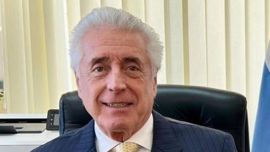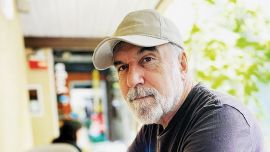Jair Bolsonaro, the candidate most feared by The Economist (and its latest cover boy) and most of the South American neighbourhood was looking hors de combat only a month ago after being stabbed during a campaign rally. He spent three weeks in hospital and out of the immediate spotlight in what seemed a spiritless campaign via social networks. But as from the last weekend of September, when the far right and former Army captain made his comeback to the political arena, he has been the master of ceremonies of an unstoppable procession towards tomorrow’s election day, leading the polls by a 14-point margin.
Procession? Yes, sir. Because Bolsonaro’s convalescence not only forced him to lower his tone and shorten his speeches but also to redouble the messages referring to God, the Fatherland and Family, the three pillars of his ultra-conservative, ethically charged and almost mystical narrative.
“I’m not corrupt; I’m a conservative candidate who respects the family with Brazil above all and God above everything else,” he repeats.
Bolsonaro’s convalescene forced him to redouble the messages referring to God, the Fatherland and Family, the three pillars of his ultraconservative, ethically charged and almost mystical narrative.Bolsonaro bolstering his ‘saintly’ discourse and lowering the tone of his ‘slugs for thugs’ proposals is owed to two factors. Firstly, that his adversaries, Fernando Haddad (of the PT, or Workers’ Party, his certain run-off rival), leftist Ciro Gomes (Democratic Labour Party, PDT) and Geraldo Alckmin of the PSDB (Brazilian Social Democracy Party) have also climbed aboard the ‘slugs for thugs’ bandwagon, which wins votes. That obviously shows all candidates to be shifting to the right.But above all, the factor most driving the exmilitary officer and deputy for the PSL (Social Liberal Party) is the endorsement of the Evangelical Churches of Brazil, crowning him with an ethical halo in a segment representing a third of the country’s population and now clamouring for an end to corruption.
His main backer here is Edir Macedo, head of the Universal Church of the Kingdom of God and a billionaire worth US$ 1.4 billion according to Forbes, thanks to his position as owner and CEO of Rede Record, the second-largest TV network after Globo TV. On Thursday night, just when TV Globo was airing the last presidential debate featuring the absence of Bolsonaro (on medical advice), Rede Record was showing Bolsonaro being interviewed at his home.
Universal Church leader Macedo not only contributes the solidly loyal votes of his evangelical faithful (the latest Datafolha opinion poll shows almost half of the Bolsonaro vote to be evangelical while only 15 percent of those intending to vote for Haddad profess that religion). He also ensures him television time, which – according to electoral law – the state is obliged to give free to political parties on the basis of the number of votes won in the previous election (very scant in the case of Bolsonaro’s PSL party). And which above all assures him media protection, given that the ex-captain and the Globo Group are not on good terms.
But even more importantly, Macedo has thus far made a historic shift to the far right. In the past the Universal Church backed and followed both Fernando Henrique Cardoso and Fernando Collor de Mello. As from 2002, Macedo approached the PT of Lula and Dilma Rousseff, achieving such proximity that he was allowed to build a monumental Temple of Solomon in the city of São Paulo which defied local building codes. Who was mayor of the city at the time of its construction? Fernando Haddad, today the man who is Bolsonaro’s main rival.
There is another pastor who has set about rallying his flock behind Jair Bolsonaro. He’s Silas Malafaia, also a teleevangelist albeit one not ranked as a billionaire on the Forbes list. Silas is the leader of the Assembly of God Church, which according to Datafolha is the biggest Protestant denomination in the country.
The Assembly of God always left its pastors free to opt for the candidate of their preference. Thus in 2010 some backed Dilma Roussef, others José Serra (PSDB) and others Marina Silva (Sustainability Network). But for tomorrow’s election they are all like an army united behind Bolsonaro against the PT. “Bolsonaro is not Jesus although he is a Messiah,” said pastor José Wellingon, the head of the largest Assembly (the candidate’s full name is Jair Messias Bolsonaro, hence the allusion).
“The PT is over,” say the pastors over and again in their sermons. For his part the evangelical caucus leader in the Chamber of Deputies, pastor Hidekazu Takayama, gave a distinctly earthly statement on the subject: “We see Bolsonaro as an insecticide against the extremists of the opposition.”
Spiritual or earthly, Bolsonaro has lately been saying little. He has not rallied, while his main communication vehicles remain YouTube, Facebook and Twitter. Even so, in the four days of the final run-up to tomorrow’s election, he has consolidated his hard-core vote. He has already been able to count on the support of the markets, which react to every advance of his voting intentions in the opinion polls by sending both the Bovespa share index and the currency higher. To that is now added the backing of the business community since Paulo Skaf, ex- president of FIESP (Federacion Industrial de São Paulo) and currently the gubernatorial candidate for the PMDB (Brazilian Democratic Movement, the party of outgoing President Michel Temer) has promised to support Bolsonaro in the runoff.
The ex-Army officer, with his retrograde and misogynistic concepts, has also somehow managed to turn his voting intentions around among women, who represent 52.5 percent of the electorate. The latest opinion polls of Datafolha and Ibope show Bolsonaro with a voting intention of 28 percent among women as against 23 percent for Haddad. He doubtless owes this advance among the female electorate to the coat-tails of the evangelical vote.
If the opinion polls are not mistaken, Bolsonaro will finish first in tomorrow’s election without having enough votes for a first-round triumph. The big question would then become if this Biblical Bulldozer, who does not campaign on TV, who does not enjoy the backing of a major political party and who promotes everything that is politically incorrect these days (xenophobia, the death penalty, gay-bashing and demolition of the welfare state) can attract the more moderate, less ideological and more rational votes in the October 28 run-off – the votes which always define a second round.
Although in today’s Brazil, where citizens are so skeptical
of traditional politics, smeared by the dirt of Lava Jato, with
13 percent unemployment and an historical recession, perhaps
the vote which best marches to the beat of the drum
will still be the most extreme, and the least rational.related news





















Comments